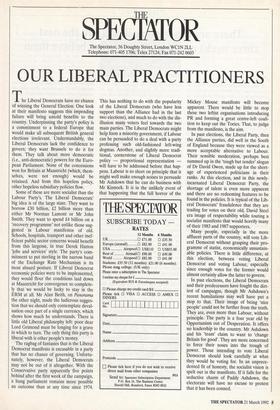SPECTATOR
The Spectator, 56 Doughty Street, London WC1N 2LL Telephone: 071-405 1706; Telex 27124; Fax 071-242 0603
OUR LIBERAL PRACTITIONERS
The Liberal Democrats have no chance of winning the General Election. One look at their manifesto suggests this impending failure will bring untold benefits to the country. Underpinning the party's policy is a commitment to a federal Europe that would make all subsequent British general elections irrelevant. Understandably, the Liberal Democrats lack the confidence to govern; they want Brussels to do it for them. They talk about more democratic (i.e., anti-democratic) powers for the Euro- pean Parliament. None of the concessions won for Britain at Maastricht (which, them- selves, were not enough) would be retained. And from this hopeless policy, other hopeless subsidiary policies flow.
Some of these are more socialist than the Labour Party's. The Liberal Democrats' big idea is of the large state. They want to borrow £30 billion, £2 billion more than either Mr Norman Lamont or Mr John Smith. They want to spend £4 billion on a `recovery programme' not unlike those sug- gested in Labour manifestos of old. Schools, hospitals, transport and other inef- ficient public sector concerns would benefit from this largesse, in true Derek Hatton `jobs and services' style. The party's com- mitment to put sterling in the narrow band of the Exchange Rate Mechanism is its most absurd posture. If Liberal Democrat economic policies were to be implemented, they would flout the conditions laid down at Maastricht for convergence so complete- ly that we would be lucky to stay in the ERM at all. Mr Alan Beith, on Panorama the other night, made the ludicrous sugges- tion that we should only contemplate deval- uation once part of a single currency, which shows how much he understands. There is little old Liberal philosophy left: poor dear Lord Grimond must be longing for a grave in which to turn. The only thing this party is liberal with is other people's money.
The ragbag of fantasies that is the Liberal Democrat manifesto is excusable in a party that has no chance of governing. Unfortu- nately, however, the Liberal Democrats may not be out of it altogether. With the Conservative party apparently five points behind after the first week of the campaign, a hung parliament remains more possible an outcome than at any time since 1974. This has nothing to do with the popularity of the Liberal Democrats (who have less support than the Alliance had in the last two elections), and much to do with the dis- illusion many voters feel towards the two main parties. The Liberal Democrats might help form a minority government, if Labour can be persuaded to do a deal with a party professing such old-fashioned left-wing dogmas. Another, and slightly more tradi- tional, cornerstone of Liberal Democrat policy — proportional representation will have to be addressed before that hap- pens. Labour is so short on principle that it might well make enough noises to persuade Mr Ashdown that he can do business with Mr Kinnock. It is in the unlikely event of that happening that the full horror of the Mickey Mouse manifesto will become apparent. There would be little to stop these two leftist organisations introducing PR and forming a great centre-left coali- tion to keep out the Tories. That, to judge from the manifesto, is the aim.
In past elections, the Liberal Party, then the Alliance parties, did well in the South of England because they were viewed as a more acceptable alternative to Labour. Their sensible moderation, perhaps best summed up in the 'tough but tender' slogan of Dr David Owen, made up for the short- age of experienced politicians in their ranks. At this election, and in this newly- incarnated Liberal Democrat Party, the shortage of talent is even more apparent and there are no redeeming features to be found in the policies. It is typical of the Lib- eral Democrats' fraudulence that they are trading for votes on their old, David Steel era image of respectability while touting a socialist manifesto that would horrify many of their 1983 and 1987 supporters.
Many people, especially in the more affluent parts of the country, will vote Lib- eral Democrat without grasping their pro- gramme of statist, economically unsustain- able policies. There is little difference, at this election, between voting Liberal Democrat and voting Labour, especially since enough votes for the former would almost certainly allow the latter to govern.
In past elections, the Liberal Democrats and their predecessors have fought the dirt- iest of campaigns, though Mr Ashdown's recent humiliations may well have put a stop to that. Their image of being 'nice people' could not be further from the truth. They are, even more than Labour, without principle. The party is a four year old by Opportunism out of Desperation. It offers no leadership to the country. Mr Ashdown and his 'team' claim to want to 'change Britain for good'. They are more concerned to force their noses into the trough of power. Those intending to vote Liberal Democrat should look carefully at what they would be voting for. In an unprece-
dented fit of honesty, the socialist vision is spelt out in the manifesto. If it falls for the seductive charm of Paddy Ashdown, the electorate will have no excuse to protest that it has been conned.


























































 Previous page
Previous page